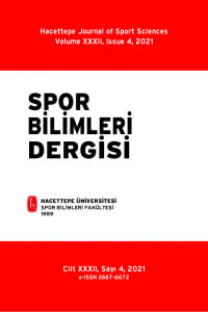"SPORDA GÖREV VE EGO YÖNELİM ÖLÇEGI -SGEYÖ-"NIN TÜRK SPORCULARl İÇiN GÜVENiRLiK VE GEÇERLİK ÇALIŞMASI
Bu çeıışmemn amacı Duda (1989a, 1992), Duda ve Nicho/ls (1992) tarafından geliştirilen "Sporda Görev ve Ego Yönelimi Ölçeğ -SGEYÖ-(Task and Ego Orientation in Sport Questionnaire-TEOSQ-)"nin Türk sporculan için güvenirlik ve geçerliğinin belirlenmesidir. Sporda görev ve ego yönelimi ölçeğ yargılarm beş değerlendirme basamağma göre yapıldığı 13 maddeden oluşmakta ve iki alt ölçeği (7 maddesi görev yönelimli hedefler, 6 maddesi ego yönelimli hedefler) içermektedir. Ölçek, basketbol, hentbol ve voleybol spor brerışterırıden, 19. 14±2.15 yaş ortalamasma sahip 155 bayan (% 50.82) ve 22.20±3.56 yaş ortalamasma sahip, 150 erkek (%49. 18)olmak üzere toplam 305 sporcuya uygulanmıştır Verilerin istatistiksel analizi için Cronbach alfa, Pearson korelasyon tekniği ve temel bileşenler faktör analizi kultsnılmışur. Elde edilen bulgulara göre, yapılan faktör analizi sonucunda maddeler orijinal ölçekte olduğu gibi 2 faktör altmda toplanmakta ve boyut/ar ise toplam veryetısın %58.4 11'ini açıklamaktadır. Ölçeğin alt boyut/anna ait madde-test korelasyonlan e n di maddelerin birbiri ve toplam puan ile anlamlı şekilde ilişkili olduğu görülmüştür. Aym zamanda ölçeğin yüksek güvenirlik ketseyıtsrırıs sahip olduğu belirlenmiştir (Cronbach alfa güvenirlik katsayısı: Görev yönelimli hedefler. 87, Ego yönelimli hedefler. 85 ve Genel. 86). Bulgular, sporda görev ve ego yönelim ölçeğinin araştırmalarda ku/lamlabileceğini göstermiştir
Anahtar Kelimeler:
SGEYÖ, Hedef yönelimi, Görev yönelimi, Ego yönelimi, Ölçek, Geçerlik, Güvenirlik
RELlABILlTY AND VALlDlTY OF "TASK AND EGO ORIENTATION IN SPORT QUESTlONNAIRE - TEOSQ-" FOR TURKISH ATHLETES
The purpose of this study was to determine the re/iability and validity of Task and Ego Orientation in Sport Questionnaire -TEOSQ- for Turkish athletes. Task and ego orientation in sport questionnaire which contains 2 subscales originally with 13 items (7 for task orietıtetiorı, 6 for ego orientation) and 5 points assessment system. Participants of the study were 155 female (% 50.82, age=19. 14±2. 15 years) and 150 male (% 49.18; eqe« 22.20±3.56 years) athletes playing either beskeıbett, hanr!ball or volleyball. Crcnbectı Alpha, Pearson Correlatian and Factor Analysis methods were used to analysis the data. The results of factor analysis used in determining construct validity indicated that items were collected under 2 faetors. These findings are the same as of the original scale. Dimensions explained 58.411 % of the total variance. When examined item to item and item to total test correlations, significant relationship was found. The scale has high reliability scores (Cronbach alpha coefficients: .87 for task orientation, .85 for ego orientation and .86 for general). All of the results showed that the task and ego orientation in sport questionnaire can be used for research purposes.
Keywords:
TEOSQ, Goal orientation, Task orientation, ego orientation, questionnaire, reliability, validity,
- Başlangıç: 1990
- Yayıncı: Süleyman BULUT
